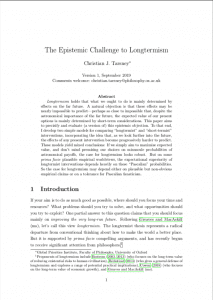The epistemic challenge to longtermism
Christian Tarsney (Global Priorities Institute, University of Oxford)
GPI Working Paper No. 3-2022, published in Synthese
Longtermists claim that what we ought to do is mainly determined by how our actions might affect the very long-run future. A natural objection to longtermism is that these effects may be nearly impossible to predict— perhaps so close to impossible that, despite the astronomical importance of the far future, the expected value of our present actions is mainly determined by near-term considerations. This paper aims to precisify and evaluate one version of this epistemic objection to longtermism. To that end, I develop two simple models for comparing ‘longtermist’ and ‘neartermist’ interventions, incorporating the idea that it is harder to make a predictable difference to the further future. These models yield mixed conclusions: if we simply aim to maximize expected value, and don’t mind premising our choices on minuscule probabilities of astronomical payoffs, the case for longtermism looks robust. But on some prima facie plausible empirical worldviews, the expectational superiority of longtermist interventions depends heavily on these ‘Pascalian’ probabilities. So the case for longtermism may depend either on plausible but non-obvious empirical claims or on a tolerance for Pascalian fanaticism.
Other working papers
Against Anti-Fanaticism – Christian Tarsney (Population Wellbeing Initiative, University of Texas at Austin)
Should you be willing to forego any sure good for a tiny probability of a vastly greater good? Fanatics say you should, anti-fanatics say you should not. Anti-fanaticism has great intuitive appeal. But, I argue, these intuitions are untenable, because satisfying them in their full generality is incompatible with three very plausible principles: acyclicity, a minimal dominance principle, and the principle that any outcome can be made better or worse. This argument against anti-fanaticism can be…
Against the singularity hypothesis – David Thorstad (Global Priorities Institute, University of Oxford)
The singularity hypothesis is a radical hypothesis about the future of artificial intelligence on which self-improving artificial agents will quickly become orders of magnitude more intelligent than the average human. Despite the ambitiousness of its claims, the singularity hypothesis has been defended at length by leading philosophers and artificial intelligence researchers. In this paper, I argue that the singularity hypothesis rests on scientifically implausible growth assumptions. …
In search of a biological crux for AI consciousness – Bradford Saad (Global Priorities Institute, University of Oxford)
Whether AI systems could be conscious is often thought to turn on whether consciousness is closely linked to biology. The rough thought is that if consciousness is closely linked to biology, then AI consciousness is impossible, and if consciousness is not closely linked to biology, then AI consciousness is possible—or, at any rate, it’s more likely to be possible. A clearer specification of the kind of link between consciousness and biology that is crucial for the possibility of AI consciousness would help organize inquiry into…

